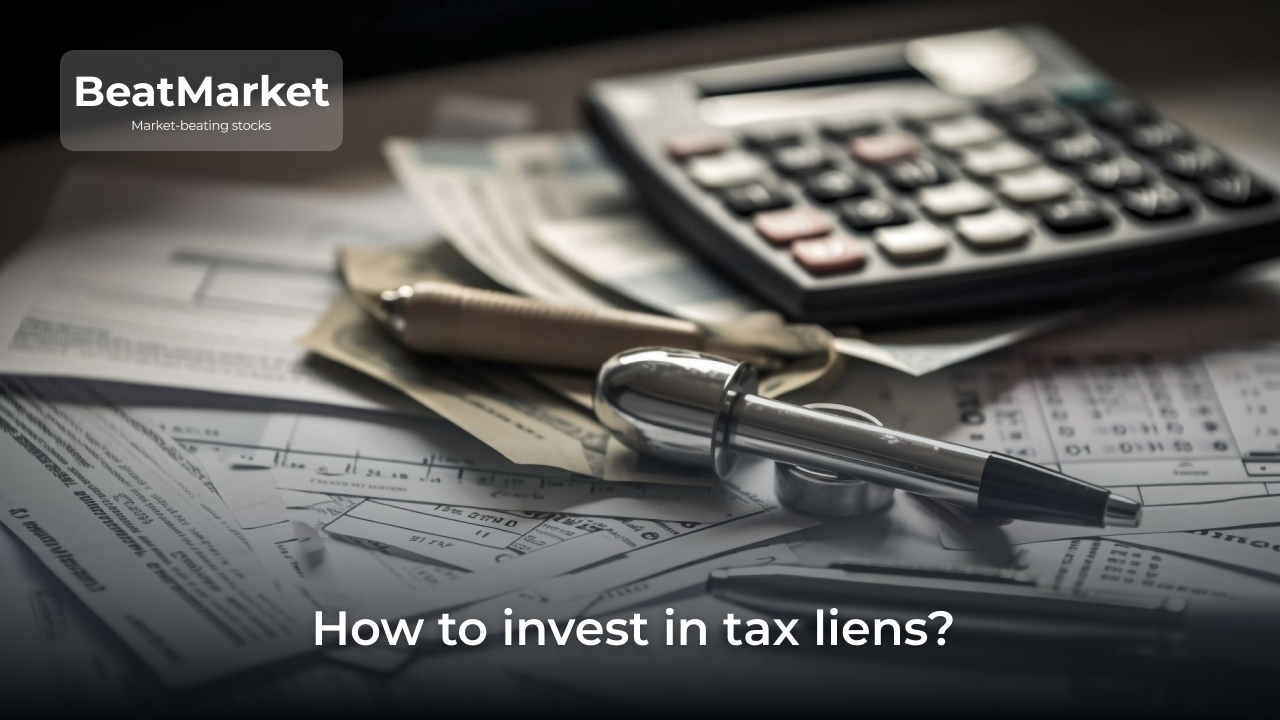- Property owners must pay real estate taxes.
- Late payment may result in a tax claim being filed.
- Taxation liens sales ensure that unpaid real estate taxes are paid to the state.
Our guide explains tax claim investing. It covers the advantages and disadvantages of this investment strategy.
Table of Contents
What is a Tax Lien?
A taxation lien is a legal claim, it means that the local government issues a tax lien when a property owner fails to pay property taxes.
A property tax lien restricts ownership of the property until the debt is paid off. This means that the property cannot be sold or refinanced.
The city or county where the real estate is located imposes the tax claim. Upon execution, a certificate is created, which is an asset that can be redeemed at auction. Tax claim investing is not available in all states.
What are Tax Lien Certificates?
Tax certificates are documents that show a tax claim on real estate. They provide details about the property and other relevant liens information.
- unpaid taxes;
- interest rate;
- maturity.
Local governments issue a tax claim and then sell tax certificates at auctions. The winner is the investor who submits the highest price or the lowest bid.
If a property owner fails to pay their taxes, they become a debtor to the investor. The debtor must pay the money before the end of the repayment period. Otherwise, the certificate owner has the right to foreclose on the property.
The repayment period ranges from 3 months to 3-4 years, with interest rates as high as 36%. The value of the certificate at the tax claim auction is determined by the investors’ valuation of the real estate.
Tax Lien States
| State | Maximum rate, % | Ultimate maturity, years |
| Alabama | 12 | 3 |
| Arizona | 16 | 3 |
| California | 18 | 3 |
| Colorado | 11 | 3 |
| District of Columbia | 18 | 0,5 |
| Florida | 18 | 2 |
| Illinois | 36 | 2 |
| Indiana | 15 | 1 |
| Iowa | 24 | 2 |
| Kentucky | 12 | 1 |
| Louisiana | 12 | 3 |
| Maryland | 24 | 2 |
| Massachusetts | 16 | 0,5 |
| Mississippi | 18 | 2 |
| Missouri | 10 | 1 |
| Montana | 10 | 3 |
| Nebraska | 14 | 3 |
| Nevada | 12 | 2 |
| New Jersey | 18 | 2 |
| New York | 14 | 1 |
| Ohio | 18 | 1 |
| South Carolina | 12 | 1,5 |
| Vermont | 12 | 1 |
| West Virginia | 12 | 1,4 |
| Wyoming | 18 | 4 |
The information comes from tax-lien-certificates.com. It is important to consider some issues, such as the fact that California is authorized to sale of tax certificates. However, auctions are only available in the San Francisco area.
Massachusetts has a statutory basis for taxation lien investing. However, most municipalities in the state do not hold auctions.
How Does Tax Lien Investing Work?
To capitalize on liens, an investor must do a considerable amount of work. Firstly, they must obtain information about future auctions, which is published by each state in its own sources. Secondly, they must evaluate the prospects of repayment or the benefits of transferring ownership.
The taxation lien investor participates in the auction and must carefully consider the size of their bid. Bids that are too small will not win, while bids that are too large will result in unfavorable deals.
If a person fails to pay their real estate taxes, they may not be able to pay off the debt. In this case, the investor may need to foreclose on the property, which could delay the repayment of the investment.
1. The Local Municipality Creates A Tax Lien Certificate
The owner receives a tax bill for real estate taxes. If the bill is not paid within the prescribed time, the person is in arrears. In such cases, a tax claim may be filed. There is still some time to pay the taxes due after the lien is filed.
2. The Tax Lien Certificate Is Put Up For Auction
The tax certificate is put up for auction when the real estate tax has not been paid. The auction can take place online or offline.
Contact your local tax assessor to find out about the next auction. The information is also published in the public domain, usually 4 weeks in advance. The post provides information about the owner, location, and other important facts.
3. Investors Bid On The Tax Lien Certificate
During the auction, private investors propose their own conditions for purchasing the certificate. They must specify the rules:
- How much are you willing to pay for the certificate;
- If you win, the interest rate you agree to will apply.
Some states calculate the rate on the lien as a percentage per year, while others use a percentage per month. It is important to note that the interest being discussed is simple interest.
4. Winning Investor Takes Control Of The Tax Lien Certificate
The winning bidder becomes the owner of the certificate. Purchasing a tax claim does not grant ownership of the property. The investor has the right to demand payment of the debt from the property owner.
Ownership changes only through the tax foreclosure process. The holder of the tax certificate initiates the process if there is non-payment.
5. Investor Pays The Amount Of Taxes Owed
The winning bidder of an auction must promptly pay the taxes, penalties, and fees owed to the treasury and property owner within 2-3 days.
The property owner must pay the investor the full amount owed, as well as the interest specified in the tax certificate.
6. Repayment Or Foreclosure
The property owner must redeem the tax certificate before the redemption period ends. This allows the holder of the certificate to recover their initial investment and earn interest.
If the debt is not repaid, the certificate holder can foreclose on the property. The investor will make a significant profit from the transfer of ownership. In most cases, the ratio of unpaid taxes to the property price ranges from 3-7%.
Recovery incurs extra costs. Furthermore, other issues may arise, such as repair expenses for a dilapidated building or challenges in evicting tenants.
How to Profit From a Lien
To make money at a public auction, thorough preparation is necessary. Assessing the profitability of buying a particular lien certificate is the most challenging aspect.
If an investor struggles with this task, they can seek assistance from experts. For instance, they can utilize the services of a company that specializes in valuations. This will help determine if the object’s value aligns with the amount to be paid.
Investing in tax claims with the hope of becoming a property owner is not a worthwhile endeavor. Statistics indicate that in 98% of cases, the real estate tax debt is paid off by the owner, with only 2% resulting in foreclosure.
In some cases, investors may not receive their money back or gain ownership of the property. For instance, if an individual investor fails to pay real estate taxes and declares bankruptcy, they may have additional liens to cover the property’s value.
Sometimes, a tax certificate may be declared invalid by a municipality due to a violation of the processing procedure.
Investing Passively Through an Institutional Investor
An institutional investor who is a member of the NTLA can help you consider investing passively from tax certificates.
About 80% of the collateral certificates market is made up of professional members. Membership in this organization provides the opportunity to participate in closed webinars and communicate with other professionals. To become a member, compliance with the Code of Ethics is mandatory.
Investing in tax claims through a fund managed by members of the National Taxation Lien Association is safer. The NTLA members have more experience and perform due diligence in the certificate screening process.
Advantages of Investing in Tax Liens
Investing in a tax certificate has several advantages. These include:
- Some certificates can be purchased for as little as $300-$400, making the entry threshold low compared to other real estate investment methods.
- High profitability. The final rate of profitability depends on the bidding process and level of competition. On average, the rate is around 7%, but it can go up to a maximum of 36%.
- The rate on the tax certificate is fixed and not affected by market fluctuations.
- The property owner makes a lump sum payment, which includes both the principal amount and interest. This money can be used for future investments or to purchase real estate tax certificates.
Disadvantages of Investing in property tax Liens
Investing in real estate tax certificates has several disadvantages. It is not suitable for beginners, despite the high returns. This asset is more appropriate for individuals with a good understanding of the real estate market.
Tax advice:
Experts do not recommend certain types of tax certificates for beginners, such as certificates related to buildings in a state of disrepair or objects that are damaging to the environment.
Neglected Properties
Investing in a tax certificate carries the risk of becoming the owner of an unimproved property, especially if the property is dilapidated or located in a slum. In such cases, even if paid, the lien owner may not receive payment if the property owner is unable to redeem the certificate during the redemption period.
Not a Passive Investment
Buying tax liens is an active investment. Profitable liens must be carefully selected. After winning the auction, the investor must comply with legal requirements. The first step is to notify the property owner within the prescribed period of time. If the debt is not repaid, repeated reminders will have to be sent.
Tax Liens Can Expire
A tax certificate has an expiration date. If the holder misses this date, they cannot take ownership of the property, and the invested money cannot be returned.
Expired taxation liens hold no value. It is important to keep track of the due dates for each certificate, which can require significant effort when participating in multiple taxation liens auctions.
Competition
Commercial institutions, such as banks and hedge funds, may be interested in real estate tax debts. Private investors may find it difficult to compete with these organizations on a shareholder basis due to their resources. These institutions often accept low returns.
A high number of bidders can decrease the return on investment for a taxation lien. To win an auction, you must offer a high price or agree to a low bid. Otherwise, you will have to decline to purchase tax certificates, resulting in less profit for the investor.
Powerful Tips for Tax Lien Certificate Investing
To benefit from a lien investing, follow these steps:
- Before making a purchase, research the local laws. The regulations for trading certificates of deposit differ from state to state.
- Verify the property. The real estate fiscal claim may exceed its actual value.
- Check the return on investment (ROI) of fiscal claims. The bottom line is affected by the rate and cost of the certificate. They depend on a variety of parameters.
- Analyze the risk of losing money. Use the ratio of the size of the tax owed to the market value of the property as a simple criterion. The higher the ratio, the greater the probability of non-payment.
- Give preference to low-cost mortgages. There is less competition for them. Most auction participants are interested in high-yielding tax investments.
A diversified portfolio is crucial, so it’s important not to focus solely on taxation lien investments. Treat tax certificates as high-risk assets.
Tax Lien vs Mortgage Lien
A real estate tax due is different from a mortgage lien. The real estate tax due is imposed compulsorily when the owner does not pay to the budget. Its purpose is to increase real estate tax collections.
A mortgage lien is a voluntary encumbrance that is formalized automatically when a mortgage is obtained. The lender owns the mortgage. Regular monthly installments by the buyer of real estate do not prevent mortgage refinancing.
The order of repayment also differs between taxation liens and mortgages. The liens are repaid in a single payment before the certificate expires, while mortgages are repaid through regular payments.
If payment is not made, the property may be foreclosed. With a mortgage, it is typical to sell the property to pay off the debt, and a third party becomes the owner. If the real estate tax certificate is not paid, it is transferred to the creditor.
Tax Lien vs Mortgage Lien
The table below summarizes the difference between real estate fiscal encumbrances and tax deeds.
| Parameter | Tax liens | Tax acts |
| Investor acquisition | Interest is charged on the deposited amount. In case of non-payment of debt, the title to the real estate is transferred | Real estate ownership |
| Required capital | Amount owed | Amount owed. Expenses for maintenance of real estate |
| Management of the property | Extremely rare | Always |
Bottom Line
Tax certificates can be a viable investment in the real estate market. However, there are many pitfalls in purchasing them. Investors should assess the probability of a return on their investment and its profitability. It is also important to pay attention to the ratio of the property’s value to the debt of its owner. Otherwise, there is a risk of becoming the owner of a dilapidated building.
People with little capital value tax certificates for investment opportunities. Low-value property debts can be purchased for a few hundred dollars. The rate is likely to be higher than for deposits and bonds.
To reduce the risks of investing in fiscal encumbrances, apply to the National Tax Lien Association. Members of this association manage funds that allow for passive earnings.
FAQ
How to Find Tax Lien Properties?
County newspapers and local government websites publish lists of properties with tax claims.
Where Can I Find Tax Liens for Sale?
The counties post auction information on their websites. They also publish information about real estate fiscal encumbrances in the local newspaper.
How to Buy a Property with Delinquent Taxes?
To invest in a tax claim, you must participate in an auction. The auction is conducted by local government authorities. To win, you must bid with the highest price or the lowest interest rate.
Are IRS Tax Liens Public Record?
The IRS sends public notices to non-paying creditors. These notices inform other creditors of legal claims against the property. Delinquent property tax lien information is included on credit reports.
<H3> Is There Any Tax Lien Loophole?
Illinois has a provision for ‘sale by mistake’ that covers listing errors. If an investor purchases a certificate with such an error, they can sell it back for the full amount with interest. This makes it a safe and favorable way to invest in fiscal encumbrances.







